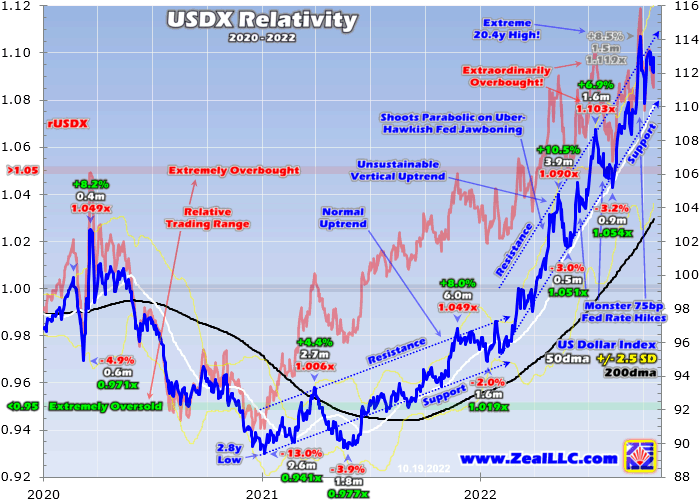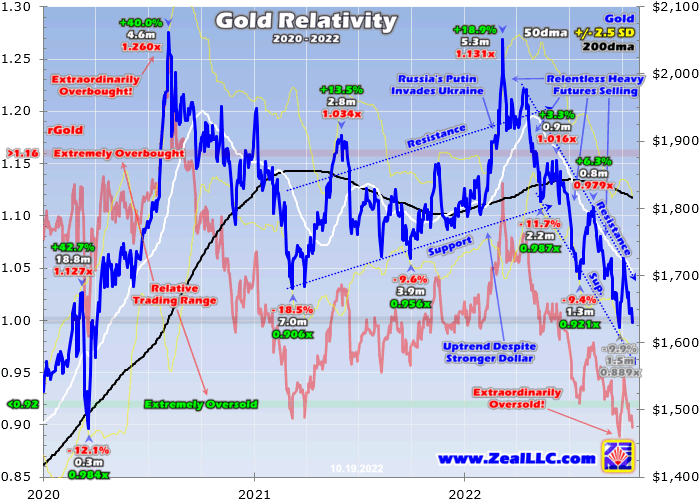The euphoric US dollar’s epic parabolic surge over this past half-year continues to sorely vex gold. The dollar’s vertical march to extreme secular highs spawned heavy gold-futures selling, slamming gold. The resulting lower gold prices have scared away investors, leaving gold languishing near deep lows despite an inflation super-spike raging. This fundamentally-absurd market anomaly can’t last, and is overdue to reverse.
Gold is behaving terribly this year, plunging 17.9% between mid-April to late September! That has left even hardened contrarian traders disheartened, increasingly wondering if gold is dead. Speculators and investors alike want nothing to do with history’s ultimate inflation hedge, even with headline Consumer-Price-Index inflation averaging stunning 8.5% year-over-year gains over the last six months. Gold looks broken.
While gold was being slammed lower by relentless gold-futures dumping, the CPI peaked in June at a cycle high up 9.1% YoY. That proved its hottest read since way back in November 1981! So we are literally suffering through a brutal inflation super-spike today, the first since the 1970s. The Fed’s extreme money printing after March 2020’s pandemic-lockdown stock panic has come home to roost, driving up prices.
Gold skyrocketed during those 1970s inflation super-spikes, as it should. The first was born in June 1972 at a CPI trough up 2.7% YoY, then peaked 30 months later in December 1974 with the CPI soaring 12.3% YoY. The monthly-average gold prices during that span soared 196.6% higher! Gold’s supply growth is heavily constrained by mining limitations, so it is bid way up during times of serious currency debasement.
The next inflation super-spike followed soon after, starting at a CPI up 4.9% YoY in November 1976 then running 40 months cresting up 14.8% YoY in March 1980. Monthly-average gold prices skyrocketed 322.4% in that span, more than quadrupling! So gold getting clubbed like a baby seal during the worst inflation by far since then is crazy-irrational. The reason is the equally-nonsensical parabolic surge in the US dollar.
Top Australian Brokers
- City Index - Aussie shares from $5 - Read our review
- Pepperstone - Trading education - Read our review
- IC Markets - Experienced and highly regulated - Read our review
- eToro - Social and copy trading platform - Read our review
During that exact 5.5-month span into late September where gold paradoxically collapsed 17.9%, the benchmark US Dollar Index soared a stupendous 14.2% higher! That is an incredibly-big-and-fast move for a major currency, which usually slowly meander like glaciers. That blistering USDX surge catapulted it to an extreme 20.4-year secular high of 114.2 in late September, spawning relentless gold-futures selling.
I analyzed this past half-year’s heavy-to-extreme gold-futures puking in depth in last week’s essay. In a nutshell, speculators are able to run colossal leverage up to 29x trading gold futures! That enables them to punch way above their weights in bullying around gold prices, but is exceedingly risky. That forces these guys to have ultra-myopic time horizons often measured in hours, so they obsess over one trading cue.
That’s the fortunes of the mighty US dollar. The gold-futures guys watch the USDX like hawks, then do the opposite. The dollar’s epic parabolic surge over the last six months is the overwhelmingly-dominant reason gold has sucked wind so dreadfully. That’s readily evident comparing these USDX and gold charts, which look like symmetrical mirror images since mid-April when the US dollar started shooting vertical.
In addition to the usual technicals, these are special Relativity charts revealing overboughtness and oversoldness. Relativity looks at prices as multiples of their own 200-day moving averages, which tend to form horizontal trading ranges. Mid-2022’s extreme price action has left the lofty USDX extraordinarily overbought and battered gold extraordinarily oversold. That means both are overdue for massive reversals!
When the US dollar is behaving normally, gold-futures speculators’ monomaniacal obsession with it fades. Between early March 2021 to early March 2022, gold powered 22.0% higher despite a parallel 7.2% USDX rally! Before that in the second half of 2020, both gold and the dollar corrected. So gold isn’t always slaved to the US dollar’s fortunes, although it certainly feels like it during this year’s crazy extremes.
These competing currencies were both bid sharply higher in late February 2022 into early March on big safe-haven buying after Russia invaded Ukraine. In just a couple weeks, gold and the USDX blasted 8.0% and 3.1% higher. But that left gold quite overbought trading at 1.131x its 200dma, and geopolitical spikes are always short-lived. Traders soon come to accept whatever surprising news initially fueled them.
Gold needed to correct after that overextension and did, plummeting 6.6% in a week. That was enough to work off the greedy sentiment, so gold stabilized and resumed grinding higher into mid-April regaining $1,977 while the USDX ran 99.9. That was when the US dollar started decoupling from reality, rocketing parabolic as raging inflation ravaged its purchasing power. Gold-futures speculators aggressively fled in response.
The increasingly popular and overcrowded USDX soared in three distinct surges since then, which are detailed in this chart. That included the initial huge 10.5% rally in just 3.9 months, another smaller-yet-still-big 6.9% over 1.6 months, then a third massive 8.5% soaring in only 1.5% months climaxing in late September. These catapulted the USDX up to 1.090x, 1.103x, and 1.119x its 200dma, extraordinarily overbought!
Relativity trading ranges are based off the last five calendar years of data, where extreme USDX levels started at 5.0% over its 200dma. Once that was exceeded, the US Dollar Index usually quickly fell in big mean-reversion selloffs. So seeing this leading dollar benchmark wildly stretched to 9.0%, 10.3%, and 11.9% above its 200dma in recent months was eye-popping! Such extremes are incredibly anomalous.
Not surprisingly that trio of huge USDX surges fueled a corresponding group of steep gold selloffs. Those gold-futures speculators aggressively dumped long contracts while adding massive short ones as the US dollar shot stratospheric. During this same span gold first plunged 11.7% in 2.2 months, then dropped another 9.4% in 1.3 months, before cratering 9.9% in 1.5 months into late September! It’s been a bloodbath.
Each sequential plunge on heavy-to-extreme gold-futures puking forced gold to extraordinarily-oversold levels. Gold’s own Relativity trading range pegs extremely-oversold levels starting at 0.92x its 200dma. But on the backs of those vertical USDX surges, gold collapsed to 0.987x, 0.921x, and 0.889x its 200dma! The latter was gold’s most oversold seen since late December 2016, far exceeding stock-panic extremes.
Realize there’s absolutely nothing normal about the US Dollar Index skyrocketing 14.2% in 5.5 months to extreme multi-decade highs! And had that not happened, there would’ve been no extreme gold-futures dumping and gold would be trading far higher today better reflecting this raging inflation. Not only is this epic dollar buying exhausted and overdue to reverse, but its extreme drivers are fading losing their shock value.
The main reason the USDX skyrocketed was the most extreme tightening ever attempted by the Fed. In its past five FOMC meetings starting in mid-March, Fed officials have hiked their federal-funds rate by 25 basis points, 50bp, then three monster 75bp hikes in a row! Early May’s 50bp was the biggest FFR hike since May 2000, while mid-June’s initial 75bp was the largest since November 1994. This is a violent hiking cycle.
Never before has the Fed catapulted rates 3.0% higher from zero in just a half-year, and it likely never will again! These extreme rate hikes were in response to Fed officials panicking about the raging inflation unleashed by their own extreme money printing. From March to September, the headline CPI ran +8.5%, +8.3%, +8.6%, +9.1%, +8.5%, +8.3%, and +8.2% YoY! And that leading inflation gauge is politically lowballed.
The Federal Open Market Committee didn’t just launch its most-extreme rate-hike cycle ever, it also birthed its most-extreme quantitative-tightening monetary destruction ever attempted. Several weeks ago I wrote a whole essay analyzing how the Fed’s QT2 is imperiling these QE4-inflated stock markets. The overwhelmingly-dominant reason this first inflation super-spike since the 1970s is raging is Fed QE4 money printing.
In just 25.5 months into mid-April 2022, the Fed foolishly ballooned its balance sheet by a truly ludicrous 115.6% or $4,807b! That effectively more than doubled the global US dollar supply in just a couple years. That radically-unprecedented deluge of new money conjured out of thin air started chasing and bidding up the prices on far-slower-growing goods and services. The Fed’s profligacy directly fueled today’s raging inflation.
QT2 is necessary to start unwinding that colossal QE4 money printing since March 2020’s pandemic-lockdown stock panic. While the original QT1 took an entire year to ramp up to its terminal velocity of $50b per month of monetary destruction, QT2 is way more aggressive. The FOMC started it at $47.5b monthly in June, and promised it would ramp to $95b per month just three months later in September!
So QT2 is ultra-aggressive compared to QT1, nearly doubling its failed predecessor’s pace after getting there in just a quarter the time! The unprecedented scale of this monetary destruction made QT2 just as extreme as the Fed’s parallel super-big-and-fast rate-hike cycle. Truly nothing like the past six months has ever before been witnessed in Fed monetary policy, and almost certainly will never happen again so fast.
Traders’ shock at all this catapulted the US Dollar Index sharply higher, primarily on rate differentials. The USDX is a basket of six major currencies, dominated by the euro at 57.6% of its total weighting. The Japanese yen and British pound follow at 13.6% and 11.9%. These three alone account for nearly 5/6ths of this leading US-dollar benchmark! And the Fed’s blistering rate hikes left them looking less attractive.
Compared to the panicking top Fed officials, the European Central Bank, Bank of Japan, and Bank of England were in no hurry to hike rates to fight their own serious inflation problems. So sovereign-bond yields on US Treasuries soared to massive premiums over European and Japanese sovereigns. That attracted vast global capital into the fast-rising US dollar and better-yielding dollar-denominated bonds.
But it wasn’t just the US dollar’s improving yield advantage on aggressive Fed hikes that fueled this year’s epic dollar surge. The euro, yen, and pound all have serious problems of their own hastening flight out of those currencies and into King Dollar. The euro cratered not just because the ECB was dragging its feet on rate hikes, but because a serious Eurozone recession looks increasingly likely on soaring energy costs.
Russia’s invasion of Ukraine and European governments’ punitive reactions slashed natural-gas imports, leaving Europe’s economy increasingly vulnerable. Long Europe’s dominant gas supplier, Russia greatly curtailed exports even before the primary pipelines were sabotaged. Resulting sky-high energy prices are tanking small businesses and hobbling consumers, lowering other spending which could force economic shrinkage.
Despite the Fed’s extreme monetary debasement, the US dollar looked a lot stabler to traders than the cratering euro. While the ECB belatedly started hiking rates fast to close the gap with the Fed, the BoJ looks hellbent on holding rates at zero forever. Even while the yen has relentlessly collapsed to 32-year lows against the US dollar, Japan’s central bank is vowing to maintain its doomed yield-curve-control scheme.
It has long aggressively monetized Japanese Government Bonds to artificially manipulate their yields under a 0.25% cap. The BoJ can’t hike rates to defend its cratering yen unless it abandons YCC, and doing that risks higher yields that could bankrupt that exceedingly-indebted country. So the US dollar also looks a heck of a lot better to global traders than the yen. The British pound has proven a nightmare lately too.
It recently collapsed to all-time lows versus the dollar after the UK’s new government proposed big unfunded tax cuts. That ignited heavy selling in longer government bonds or gilts, catapulting their yields higher. That in turn threatened UK pension funds with margin calls, fomenting a third-world-style currency crisis in the legendary British pound! So global traders have fled that currency to the safer US dollar as well.
But just like the shock value of the Fed hiking 300bp off a zero-interest-rate policy and launching that outsized QT2 are passing, so will the near panics in the USDX’s three largest components. European governments are heavily importing liquefied natural gas to offset the lack of Russian supplies, leaving storage fuller than normal heading into winter. And the ECB is hiking rates fast, closing that yield differential.
Since it won’t abandon that ill-fated YCC manipulation, the Bank of Japan will be forced to increasingly intervene to stop the yen from crashing. That will mean dumping some of its vast $1.2t hoard of foreign-currency reserves, selling US dollars and US Treasuries to buy up yen. At sufficient scale, that will help strengthen the latter at the former’s expense. Traders will pile into the recovering yen to ride its upside momentum.
And on the UK front, the Bank of England has won a faceoff with the new government forcing it to resign. Those pound-killing tax cuts are dead, gilt yields are moderating, and the British currency is rebounding as that crisis passes. So the wildly-oversold pound, euro, and yen are likely to see major mean-reversion buying as the extraordinarily-overbought US dollar suffers massive mean-reversion selling in coming months.
Competing currencies aside, there are plenty of reasons to flee the lofty dollar. Euphoria and greed are extreme in this epically-overcrowded trade, which implies all the buyers have already been sucked in. That leaves only sellers, which will fuel cascading downside momentum. And even if the Fed continues hiking its FFR from the current 3.1% to its officials’ 4.6% target in 2023, serious dollar debasement will persist.
Remember CPI inflation averaged 8.5% YoY over this past half-year when the USDX soared. That is still almost double Fed officials’ terminal FFR target, meaning holding US dollars or Treasuries will guarantee big real losses. And real-world inflation is likely running over double those intentionally-lowballed CPI prints, so the actual purchasing-power erosion is much worse. Inflation super-spikes are seriously dollar-bearish.
With this euphoric unsustainably-overextended US dollar overdue to collapse soon and mean revert sharply lower, gold is poised to do the opposite. That relentless heavy-to-extreme gold-futures selling since mid-April has left speculators’ positioning exceedingly bearish and their capital firepower available for selling exhausted. That means massive mean-reversion buying is imminent, as I analyzed last week.
Mere mean reversions in the USDX and gold would return them to their 200dmas, which are running way down at 103.3 and way up at $1,815. But after sentiment and positioning extremes, prices don’t simply stop at their averages. Strong momentum-chasing trading fueling mean reversions nearly always leads them to overshoot proportionally to the opposite extreme. That portends far bigger swings in the dollar and gold.
For gold to recover as far above its 200dma as it was pounded under during late September’s extreme oversoldness, it would need to soar way back up near $2,017! And that is just technicals, excluding the massive gold-investment buying coming as the Fed’s inflation continues raging out of control. So the days of the euphoric US dollar vexing gold are numbered, these technical and sentimental extremes can’t last.
The biggest beneficiaries of gold’s huge mean-reversion upleg will be the brutalized gold miners’ stocks. After being bludgeoned to false panic-level lows, they started to sharply V-bounce with gold out of recent spec-gold-futures extremes. While that was interrupted by renewed gold-futures shorting on resurgent dollar strength, gold stocks’ powerful rally will resume with a vengeance with gold-futures mean-reversion buying.
If you regularly enjoy my essays, please support our hard work! For decades we’ve published popular weekly and monthly newsletters focused on contrarian speculation and investment. These essays wouldn’t exist without that revenue. Our newsletters draw on my vast experience, knowledge, wisdom, and ongoing research to explain what’s going on in the markets, why, and how to trade them with specific stocks.
That holistic integrated contrarian approach has proven very successful, yielding massive realized gains during gold uplegs like this overdue next major one. We extensively research gold and silver miners to find cheap fundamentally-superior mid-tiers and juniors with outsized upside potential as gold powers higher. Our trading books are full of them starting to really surge. Subscribe today and get smarter and richer!
The bottom line is the euphoric US dollar has sorely vexed gold this year. The dollar’s epic parabolic rally to lofty secular highs on extreme Fed tightening and other major currencies’ woes unleashed huge gold-futures selling. That slammed gold sharply lower despite an inflation super-spike raging out of control. But the resulting technical and sentimental extremes in both the dollar and gold are overdue to reverse hard.
This past half-year’s massive US-dollar buying and gold-futures selling is petering out, exhausted. That portends huge mean-reversion-overshoot reversals over coming months. Big dollar selling and big gold buying will cascade, feeding on themselves as traders increasingly chase that strong momentum. Given this miserable inflationary backdrop, the debased US dollar needs to head way lower while gold soars way higher.







